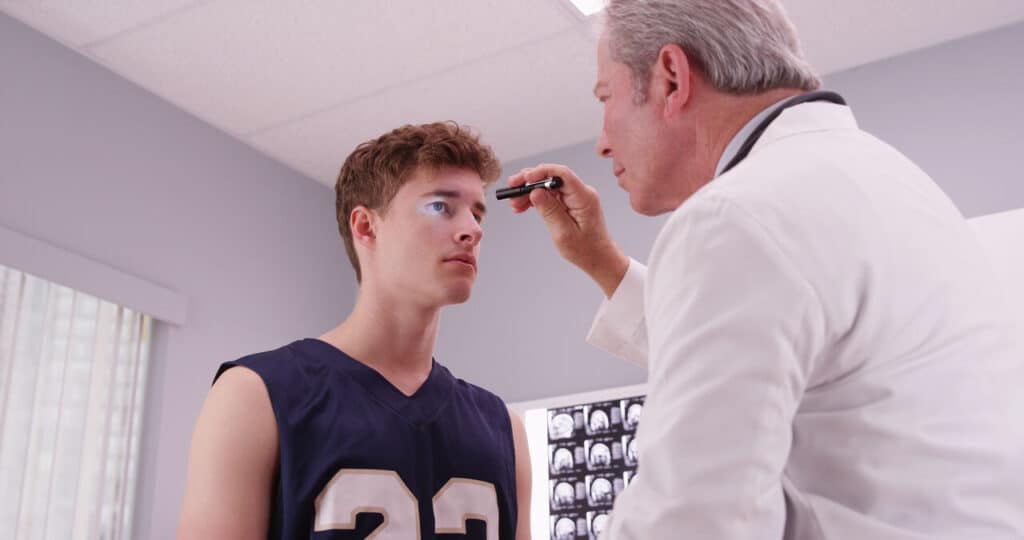
Concussions are a common type of head injury that can impact both physical and cognitive health, often resulting in symptoms that may last days, weeks, or even longer. Recognizing concussion symptoms early is essential, as timely treatment for concussions can prevent further complications and support a smoother recovery. Understanding the signs, duration, and risks associated with concussions can help individuals take immediate action after a head injury. This blog explores the common symptoms, recovery timelines, and when to seek medical care to promote safe healing and prevent long-term effects.
Common Symptoms of a Concussion
The most common symptoms of a concussion include:
- Headaches: A persistent or throbbing headache is one of the most common signs of a concussion and can last for hours or even days following the injury. This headache often worsens with movement or activity and can be accompanied by sensitivity to light and sound.
- Dizziness: Many individuals experience dizziness or a sensation of spinning shortly after a concussion. This can affect balance and coordination, making it difficult to move around safely and increasing the risk of falls or further injury.
- Nausea: Feelings of nausea are common, especially within the first few hours following a concussion. Some individuals may also experience vomiting, which indicates a need for immediate medical attention to assess the severity of the injury.
- Blurred Vision: Vision problems, such as blurred or double vision, can occur due to disruptions in the brain’s ability to process visual information. This symptom can make it challenging to focus on tasks, read, or use digital devices comfortably.
- Sensitivity to Light or Noise: Sensitivity to bright lights or loud noises often develops after a concussion. This symptom can make it uncomfortable to be in well-lit or noisy environments, prompting individuals to seek quieter, dimmer spaces for relief.
- Difficulty Concentrating: Cognitive symptoms like trouble focusing or maintaining attention on tasks are common following a concussion. This can impact daily activities, work, or school performance, as the brain requires rest to recover fully.
- Confusion: Feeling mentally “foggy” or confused is a typical sign of a concussion. This can manifest as disorientation or a sense of being mentally scattered, making it hard to follow conversations or complete tasks.
- Memory Problems: Short-term memory issues are frequently reported, particularly difficulty recalling events leading up to or immediately following the injury. This memory lapse is a significant indicator of a concussion and may gradually improve over time.
- Emotional Symptoms: These include irritability, anxiety, and mood swings. Concussions can disrupt mood regulation, leading to sudden changes in emotional responses. Many individuals report feeling more easily frustrated, anxious, or tearful, which can add stress to the recovery process.
- Physical Signs: Symptoms like fatigue, poor coordination, and balance issues may also appear after the injury. Fatigue often results from the brain’s need to use more energy for healing, while coordination and balance issues stem from the brain’s temporary difficulty in processing physical movements.
These symptoms collectively indicate a concussion and often require a period of rest and medical attention to support proper recovery.
How Soon After an Injury Do Concussion Symptoms Typically Appear?
Concussion symptoms typically appear within minutes to hours after an injury. However, in some cases, symptoms can develop or worsen over the first 24 to 48 hours. It is important to monitor yourself or anyone who has experienced a head injury for delayed symptoms such as increased confusion, worsening headaches, or changes in behaviour.
Identifying the Signs of a Concussion: Children vs. Adults
Signs of a concussion can vary between children and adults. In children, symptoms might include excessive crying, changes in sleeping patterns, loss of interest in toys or activities, and refusal to eat. Adults may report headaches, confusion, dizziness, or blurred vision. In both cases, symptoms like vomiting, loss of consciousness, or difficulty waking up indicate a need for immediate medical attention.
How Long Do Concussion Symptoms Usually Last?
The duration of concussion symptoms varies, but most people recover within 7 to 10 days. However, some may experience symptoms for weeks or even months, a condition known as post-concussion syndrome. Rest, hydration, and following a healthcare provider’s recommendations are essential for speeding up recovery.
What Should You Do If You Suspect You Have a Concussion?
If you suspect you have a concussion, taking immediate action is essential to protect your health and support recovery. The first and most important step is to seek medical attention as soon as possible. A healthcare provider can assess your symptoms, determine the severity of the concussion, and create a personalized treatment plan.
During the early stages of recovery, rest is critical. Your brain needs time to heal, which means avoiding both mental and physical exertion. Activities that should be temporarily avoided include:
- Sports or Physical Exercise: Physical activity can strain your brain and increase the risk of further injury.
- Work or School Tasks: Concentrating on work or studies may prolong symptoms and slow down recovery.
- Screen Time and Digital Devices: Using screens can worsen symptoms like headaches and blurred vision.
It’s essential to follow your healthcare provider’s specific guidelines for returning to activities. These return-to-activity recommendations are tailored to each individual and help prevent further injury or setbacks in the recovery process.
By prioritizing rest and gradually easing back into your regular routine based on professional guidance, you can reduce the risk of complications and support a smoother recovery.
Can Concussion Symptoms Worsen Over Time If Left Untreated?
Concussion symptoms can worsen if left untreated. Ignoring symptoms may lead to prolonged recovery, post-concussion syndrome, or a second concussion before healing fully, known as second impact syndrome. This can cause severe complications, including brain swelling and permanent damage.
Long-Term Effects of Repeated Concussions
Experiencing repeated concussions can lead to a range of long-term effects that impact both cognitive and emotional well-being. Some of the most common consequences include:
- Chronic Headaches: Persistent headaches often develop as a result of repeated head trauma, affecting daily comfort and quality of life.
- Memory Issues: Difficulties with short-term and long-term memory are common in individuals with multiple concussions, making it challenging to recall information or events.
- Mood Disorders: Depression, anxiety, and irritability frequently occur among individuals with a history of repeated concussions, as head injuries can affect areas of the brain responsible for emotional regulation.
- Difficulty Concentrating: Focusing on tasks can become increasingly challenging, especially with tasks that require sustained attention or complex thinking.
- Chronic Traumatic Encephalopathy (CTE): One of the most serious risks of multiple concussions, especially among athletes, is the development of CTE, a progressive and degenerative brain condition linked to repeated head injuries. CTE can cause severe emotional and cognitive changes, including depression, aggression, and memory loss, ultimately impacting overall quality of life.
Early assessment and proper treatment are crucial to minimizing the risk of long-term complications. Monitoring and managing symptoms with healthcare providers can help reduce the effects of repeated head trauma and protect long-term cognitive health.
Let Us Help You Clear the Fog
If you or a loved one is experiencing symptoms of a concussion, it’s crucial to get professional guidance as soon as possible. At Body Works Physiotherapy in Scarborough, our team is dedicated to providing comprehensive care to help you manage symptoms and recover safely. Don’t let a concussion impact your health and daily life—reach out to us today to schedule an assessment and receive the support you need for a healthy recovery.

